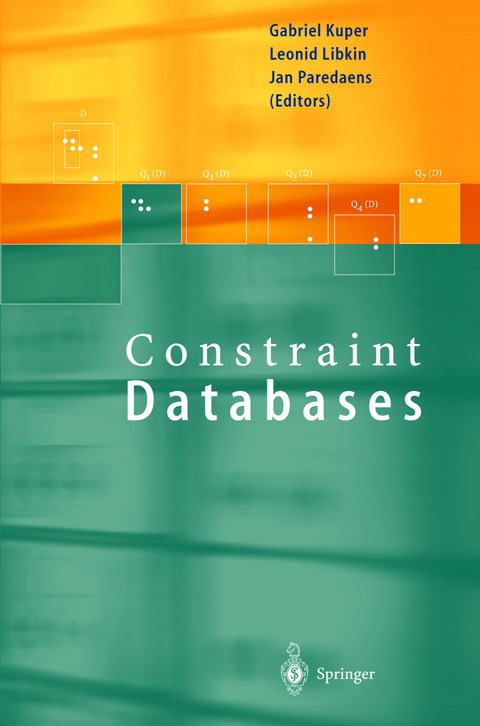
Constraint Databases
Seiten
2000
|
2000
Springer Berlin (Verlag)
978-3-540-66151-1 (ISBN)
Springer Berlin (Verlag)
978-3-540-66151-1 (ISBN)
This book is the first comprehensive survey of the field of constraint databases, written by leading researchers. Constraint databases are a fairly new and active area of database research. The key idea is that constraints, such as linear or polynomial equations, are used to represent large, or even infinite, sets in a compact way. The ability to deal with infinite sets makes constraint databases particularly promising as a technology for integrating spatial and temporal data with standard relational databases. Constraint databases bring techniques from a variety of fields, such as logic and model theory, algebraic and computational geometry, as well as symbolic computation, to the design and analysis of data models and query languages.
This book is the first comprehensive survey of the field of constraint databases. Constraint databases are a fairly new and active area of database research. The key idea is that constraints, such as linear or polynomial equations, are used to represent large, or even infinite, sets in a compact way. The ability to deal with infinite sets makes constraint databases particularly promising as a technology for integrating spatial and temporal data with standard re lational databases. Constraint databases bring techniques from a variety of fields, such as logic and model theory, algebraic and computational geometry, as well as symbolic computation, to the design and analysis of data models and query languages. The book is a collaborative effort involving many authors who have con tributed chapters on their fields of expertise. Despite this, the book is designed to be read as a whole, as opposed to a collection of individual surveys. In par ticular, the terminology and the style of presentation have been standardized, and there are multiple cross-references between the chapters. The idea of constraint databases goes back to the late Paris Kanellakis.
This book is the first comprehensive survey of the field of constraint databases. Constraint databases are a fairly new and active area of database research. The key idea is that constraints, such as linear or polynomial equations, are used to represent large, or even infinite, sets in a compact way. The ability to deal with infinite sets makes constraint databases particularly promising as a technology for integrating spatial and temporal data with standard re lational databases. Constraint databases bring techniques from a variety of fields, such as logic and model theory, algebraic and computational geometry, as well as symbolic computation, to the design and analysis of data models and query languages. The book is a collaborative effort involving many authors who have con tributed chapters on their fields of expertise. Despite this, the book is designed to be read as a whole, as opposed to a collection of individual surveys. In par ticular, the terminology and the style of presentation have been standardized, and there are multiple cross-references between the chapters. The idea of constraint databases goes back to the late Paris Kanellakis.
1. Introduction.- 2. Constraint Databases, Queries, and Query Languages.- 3. Expressive Power: The Finite Case.- 4. Expressive Power: The Infinite Case.- 5. Query Safety with Constraints.- 6. Aggregate Languages for Constraint Databases.- 7. Datalog and Constraints.- 8. Geographic Information Systems.- 9. Linear-Constraint Databases.- 10. Topological Queries.- 11. Euclidean Query Languages.- 12. Genericity in Spatial Databases.- 13. Linear Repeating Points.- 14. Optimization Techniques.- 15. Constraint Algebras.- 16. I/O-Efficient Algorithms for CDBs.- 17. The DEDALE Prototype.- 18. The DISCO System.- 19. SQL/TP: A Temporal Extension of SQL.
| Erscheint lt. Verlag | 12.4.2000 |
|---|---|
| Zusatzinfo | XVII, 428 p. |
| Verlagsort | Berlin |
| Sprache | englisch |
| Maße | 155 x 235 mm |
| Gewicht | 698 g |
| Themenwelt | Mathematik / Informatik ► Informatik ► Datenbanken |
| Informatik ► Theorie / Studium ► Compilerbau | |
| Schlagworte | algorithms • Constraint • constraints • Database • Databases • Datalog • data model • Datenbank • Datenbanken • GIS • Logic • Logik • Optimization • query language • Relational Database • Spatial Database • SQL |
| ISBN-10 | 3-540-66151-4 / 3540661514 |
| ISBN-13 | 978-3-540-66151-1 / 9783540661511 |
| Zustand | Neuware |
| Haben Sie eine Frage zum Produkt? |
Mehr entdecken
aus dem Bereich
aus dem Bereich
a beginner's guide to learning llvm compiler tools and core …
Buch | Softcover (2024)
Packt Publishing Limited (Verlag)
CHF 69,80


